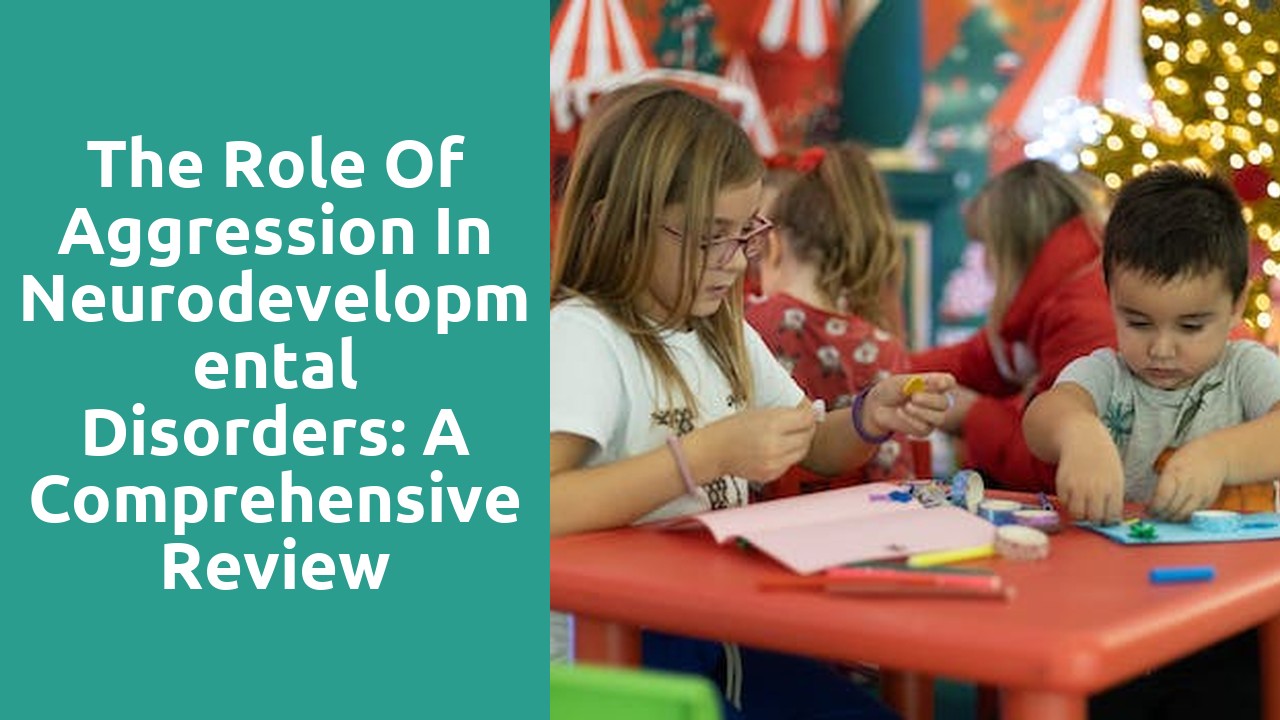

Aggression and neurodevelopmental disorders have a complex relationship that continues to baffle researchers. While aggression is often observed in individuals with neurodevelopmental disorders such as autism spectrum disorder (ASD), attention deficit hyperactivity disorder (ADHD), and conduct disorder (CD), the underlying mechanisms that drive this behavior are far from clear. However, scientists have made significant strides in unraveling this intricate relationship, shedding light on potential factors that contribute to aggressive behaviors in individuals with these conditions.
One key factor that has been explored is the impact of neurodevelopmental disorders on social functioning. Research consistently shows that individuals with conditions such as ASD, ADHD, and CD often struggle with social interactions and understanding social cues. This difficulty in socialization can lead to frustration and isolation, which in turn may manifest as aggression. Furthermore, individuals with neurodevelopmental disorders may have impairments in emotion regulation and impulse control, which can also contribute to aggressive behaviors. Overall, understanding the impact of neurodevelopmental disorders on social functioning is essential in comprehending the complex relationship between aggression and these conditions.
Neurodevelopmental disorders are a diverse group of conditions that affect the development of the brain and nervous system. These disorders include autism spectrum disorder, attention-deficit/hyperactivity disorder (ADHD), intellectual disabilities, and others. While the specific symptoms and severity of each disorder can vary widely, one common thread that runs through many of them is the presence of aggressive behaviors.
Aggression is often seen as a hallmark feature of neurodevelopmental disorders, but understanding the impact that these disorders have on aggressive behaviors is complex. The relationship between aggression and neurodevelopmental disorders is multidimensional, involving a combination of genetic, environmental, and neurobiological factors. Researchers have been working tirelessly to unravel the intricacies of this relationship, aiming to shed light on the underlying mechanisms that drive aggressive behaviors in individuals with neurodevelopmental disorders.
Aggression is a complex behavior that can manifest in various forms, ranging from verbal outbursts to physical violence. In individuals with neurodevelopmental disorders, aggression may be particularly prevalent. To understand the neurobiological basis of aggression in these individuals, researchers have turned their attention to the underlying brain structures and processes.
One area of interest is the amygdala, a region deep within the brain that plays a crucial role in regulating emotions. Studies have shown that abnormalities in the amygdala may contribute to heightened aggression in individuals with neurodevelopmental disorders. For example, individuals with autism spectrum disorder (ASD) have been found to have differences in the size and connectivity of their amygdala compared to typically developing individuals. These differences may disrupt the normal processing of emotional stimuli and contribute to the difficulties in anger regulation often seen in individuals with ASD. Similarly, research on individuals with attention deficit hyperactivity disorder (ADHD) has revealed altered amygdala functioning, which may contribute to impulsivity and difficulties in anger management. By unraveling the neurobiological underpinnings of aggression in neurodevelopmental disorders, researchers hope to develop targeted interventions and therapies to better support individuals with these conditions.
Aggression in individuals with neurodevelopmental disorders is a complex phenomenon that can be influenced by various social factors. One such factor is the presence of a stressful or chaotic home environment. Research has shown that children with neurodevelopmental disorders who experience high levels of family conflict, inconsistent discipline, and inadequate parental support are more likely to exhibit aggressive behaviors. This suggests that a lack of stability and nurturing in the home can contribute to the development and escalation of aggression in individuals with these disorders.
Furthermore, peer relationships can also play a significant role in shaping aggressive behaviors in individuals with neurodevelopmental disorders. Children with these disorders may struggle with social skills and face challenges in forming positive relationships with their peers. As a result, they may experience rejection, isolation, and bullying, which can contribute to feelings of frustration and anger. These negative interactions with peers can act as triggers for aggressive behaviors, as individuals with neurodevelopmental disorders may resort to aggression as a means of defending themselves or asserting their dominance in social situations.
Aggressive behaviors in individuals with neurodevelopmental disorders have long been a topic of interest for researchers and clinicians alike. While the underlying causes of aggression in these individuals are complex and multifaceted, recent studies have shed light on the role of genetic and environmental factors in driving such behaviors.
Genetics is known to play a significant role in shaping an individual's predisposition towards aggression. Research has identified specific genes that contribute to aggressive behaviors in neurodevelopmental disorders, such as those involved in regulating serotonin levels in the brain. Additionally, variations in genes related to the functioning of the prefrontal cortex, amygdala, and other regions implicated in emotion regulation have also been linked to increased aggression. However, it is important to note that genetic factors alone are not sufficient to fully explain the development of aggressive behaviors, as they interact with various environmental influences.
The cognitive aspects of aggression in individuals with neurodevelopmental disorders have garnered significant attention in recent research. With the aim of shedding light on this complex relationship, scientists have delved into understanding the underlying cognitive processes that contribute to aggressive behaviors. Cognitive deficits, such as difficulties in self-regulation, impulse control, and emotional processing, have been consistently identified as key factors influencing the manifestation of aggressive behaviors in individuals with neurodevelopmental disorders.
One key area of cognition that has been extensively studied is executive functioning. Executive functions, which include skills such as planning, organizing, and inhibiting inappropriate behaviors, play a crucial role in regulating aggression. Individuals with neurodevelopmental disorders often exhibit deficits in executive functioning, making it more challenging for them to effectively control their aggressive impulses. This can result in impulsive and maladaptive reactions to various social and environmental stimuli, contributing to the emergence of aggressive behaviors. By examining the cognitive aspects of aggression, researchers hope to uncover specific cognitive processes that can be targeted in interventions aimed at reducing aggression in individuals with neurodevelopmental disorders.